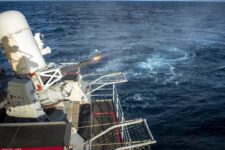
A team from the U.S. Coast Guard Academy participated in the National Security Agency’s 20th annual National Cyber Exercise (NCX) April 8-10, 2021. (U.S. Coast Guard photo by Petty Officer 2nd Class Hunter Medley)
WEST 2023 — The US Coast Guard needs to start treating its data as a strategic asset much like how it does its ships and aircraft if it wants to become a more data-driven enterprise, according to officials responsible for its network and cloud efforts.
“We know how to take care of our ships and aircraft, we know how to overhaul them, we know how to bring them in on a depot cycle, we know how to do the old level maintenance on the ships and aircraft, you know, at the pier, in the hangar. Well, we don’t know how to take care of our data,” Capt. Brian Erickson, chief data officer, said today at the WEST 2023 conference.
“We don’t have data stewards, we don’t have a structure right now of data ownership,” he continued. “Who owns the data? Who is going to care for it? Who’s going to build it as a product for the rest of the organization to gain those insights at speed? And so that is a lot of what my team is working on.”
Erickson, who also serves as the chief of the Coast Guard’s newly stood-up Office of Data and Analytics, said the office has formed three divisions — one focused on data analytics, another for data governance and strategy and a data integration division — to help the Coast Guard to become a data-driven organization.
FULL COVERAGE: Breaking Defense reports from West 2023
The office is building a “federated model of data teams” that are planted within individual business units so they can both pursue their own individual priorities and the organization as a whole, he said.
“Now we need access to that data,” Erickson said. “So we need to get the right analytic to the right person at the right time, whether that’s a visualization or dashboard for a senior leader or a playground for a trade analyst to explore. We have to eliminate that friction from the producer to the consumer. And that’s something we just really haven’t focused on in the past and the organization.”
In an effort to become more data-driven, the Coast Guard is also moving from a predominantly on-premises hosted solution for its data warehouses to leveraging cloud opportunities from industry, Cdr. Jonathan White, C5I Service Center’s cloud and data branch chief, said.
“Right now when we’re making changes to our on-prem environment, it just takes too long,” White said. “I think that leveraging cloud will get us there faster and it’ll provide us with better solutions than we could do on-prem. And we’re really excited about digging into that domain.”
Heading for the cloud, the Coast Guard wants to rapidly modernize its 90 legacy apps and 50 disparate cloud apps. Putting a common compute platform and storage platform on board its legacy assets while bringing new assets online is a key focus. Over the next five years, the Coast Guard plans to focus its investments on its infrastructure to build that foundation “to really drive capability in the field, to drive capability in our regional edges and in our headquarters as well,” White said.
“We have limited and siloed data services,” White said. “We have a ton of databases out there. They don’t share information with each other, or we put information into a singular data warehouse that’s very rigid and hard to work with.”






















